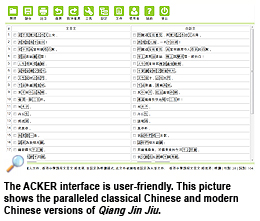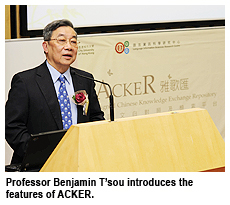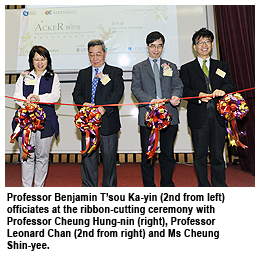CityU launches the first classical-colloquial Chinese alignment platform
Michelle Leung
City University of Hong Kong (CityU) has developed the first electronic platform in Hong Kong for classical-colloquial Chinese alignment, processing and retrieval. The platform is expected to enhance the teaching of classical Chinese through the use of information technology.
Classical Chinese literature is a valuable resource for studying and appreciating Chinese culture but students today find it difficult to understand classical Chinese literature without the help of notes and paraphrases. The Language Information Sciences Research Centre (LISRC) of CityU, by applying the state-of-the-art natural language processing technologies, has developed the online platform called the Aligned Chinese Knowledge Exchange Repository (ACKER) to enhance the use and manipulation of classical Chinese via their paraphrases into modern Chinese.
The user-friendly ACKER interface is web-based and compatible with most web browsers. Without installing any new software, users can simply upload a piece of classical Chinese text and its corresponding modern Chinese version, and the system will auto-align and verify the two versions, by sentences and words. This would assist teachers and publishers in preparation of teaching materials, besides encouraging students to take greater interest in classical Chinese.
Professor Horace Ip Ho-shing, Acting Vice-President (Research and Technology) and Acting Dean of Graduate Studies, said the successful launch of ACKER was an excellent example of CityU’s dedication to enhancing learning, research and knowledge transfer.
According to Professor Benjamin T'sou Ka-yin, LISRC Director and Chair Professor of the Department of Chinese, Translation and Linguistics, the project was started in October 2008, with the support of a HK$1m grant from the government’s Innovation and Technology Fund.
“Current registered users can access the platform for free. I hope the platform can be further promoted and enhanced with the government’s support to benefit more teachers and students,” said Professor T'sou.
In the pilot testing phase, about 100 teaching and administrative staff members from different universities and secondary schools were invited to give feedback for system enhancement. Currently ACKER has a collection of about 500 pieces of classical Chinese texts (with nearly 190,000 classical Chinese characters) and their modern Chinese counterparts, including famous Chinese classics like The Analects of Confucius and Yanshi Jiaxun (The Family Counsels of Mr Yan), and a number of articles commonly found in current secondary school Chinese textbooks.
Scholars and guests commended ACKER at the launch ceremony held on 15 March. Chair Professor Cheung Hung-nin, Department of Chinese Language and Literature, The Chinese University of Hong Kong, said classical Chinese is the base of Chinese culture and ACKER, which facilitates the learning of classical and colloquial Chinese, has its social significance. Chair Professor Leonard Chan, Dean, Faculty of Languages, Hong Kong Institute of Education (HKIEd), believed the learning of classical Chinese is still very important nowadays. Ms Cheung Shin-yee, Editor-in-chief, The Commercial Press (HK) Ltd, said ACKER, as a product by the dedicated efforts of scholars, will benefit both the developer and publishers.
Dr Tse Ka-ho, Associate Professor, HKIEd’s Department of Chinese, was one of the trial users. He commented that ACKER has multiple functions and is suitable for scholars, teachers and students of secondary and primary schools and self-learners.
Users can verify and update the content and improve the accuracy of paralleled sentences and words with the embedded dictionaries and knowledge database. As the number of users grows, more texts will be stored in the system; expansion of the database and further improvement would facilitate wider knowledge sharing.
In addition, ACKER provides a search engine enabling bi-directional retrieval functions. By simply entering a Chinese word, users can retrieve all articles containing that specific word, and its different contextual meanings. The advanced search function allows searches by prefixes and suffixes.
Please visit ACKER’s website (https://acker.chilin.hk/) for details.


